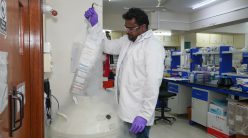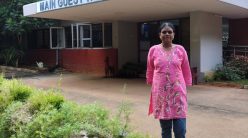CONNECT shadowed Sudip Ghosh, a CV Raman postdoctoral fellow at the Centre for High Energy Physics

(Photo: KG Haridasan)
It is a pleasant bright morning, unlike the last few days that were rainy. Sudip enters the Indian Institute of Science campus through the D gate. It is just a 10-minute walk from his apartment. Today, he is brimming with excitement as he is looking forward to sharing his recent progress with his supervisor, Aninda Sinha, a Professor at the Centre for High Energy Physics (CHEP). Sudip is a CV Raman postdoctoral fellow at the Centre. Once at the CHEP building, he leaves his belongings in his cubicle on the second floor and goes to meet Aninda.
Aninda has recently made interesting connections between ‘scattering amplitude’, which is the primary topic of study in Sudip’s research work, and an area of mathematics known as ‘knot theory’. He discusses this with Sudip. Sudip, on the other hand, is glad to describe the solution to the problem that he had been struggling with for a long time. After several extensive discussions with his postdoctoral colleague, Prasanth Raman, he has finally solved the problem that had obstructed his progress. It was only yesterday that they had found this appropriate method to resolve the problem. Today definitely looks like a promising day.
He does his calculations with a pen and paper, in the old-fashioned way
Back in his office, Sudip switches on his laptop and works on some equations. He does his calculations with a pen and paper, in the old-fashioned way. A large part of the work of a theoretical physicist like himself involves complex mathematical problems. Every now and then, when the calculations get tough to solve, he uses a software programme called ‘Mathematica’. Today, he is working on the paper that he is writing with Aninda and Prasanth.
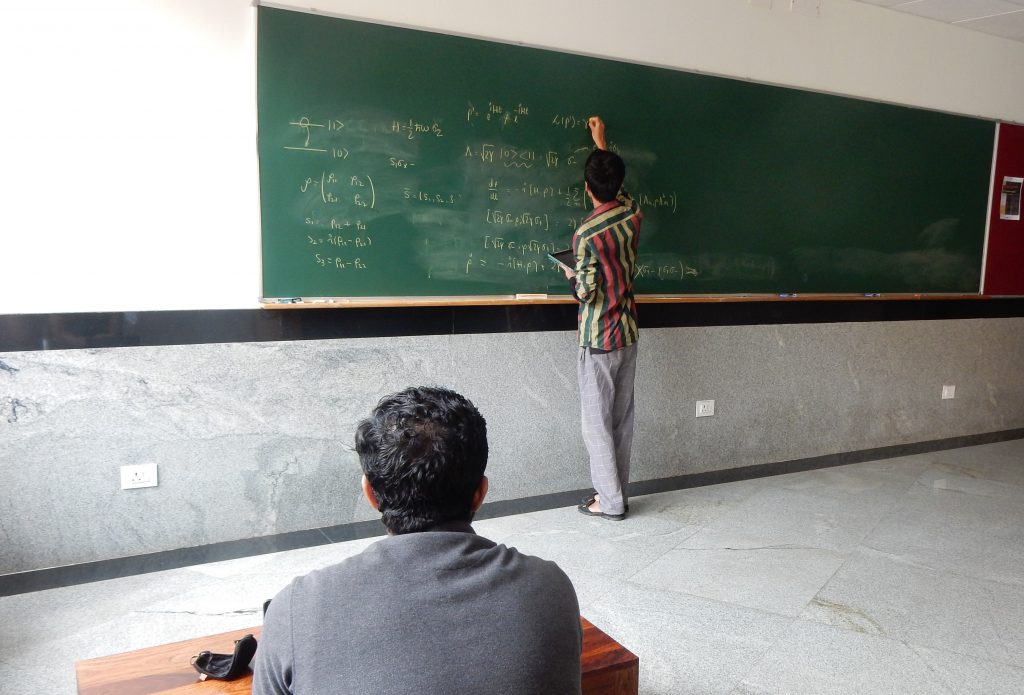
Most often, postdoctoral fellows work independently, with only a little guidance from their supervisors. He refers to a paper on arXiv.org, a repository site where research scholars upload their unpublished papers. Sites such as this help researchers exchange ideas. In the past, Sudip has uploaded 14 of his papers to this site. He is currently referring to a paper on “Applications of Alpha Space” by Daniel Rutter and Balt C van Rees. He wants to understand how the authors approached a particular mathematical function. He says, “It helps me understand the properties of the function, and think about possible methods to break down the function to use for my own calculations.”
Sudip joined IISc in October 2021. Before that, he was a postdoctoral fellow in Okinawa, Japan for three years. He completed his PhD from the International Centre for Theoretical Sciences (ICTS) in Bangalore in 2018; therefore, IISc is not new to him. He had, in fact, used the JRD Tata Memorial Library at IISc extensively during his PhD, since the ICTS library was still being set up at that time.
When he was in Japan, Sudip learnt to cook. He enjoyed cooking biryani there. In Bangalore, however, he misses cooking, as now he lives with his mother, and she takes care of it entirely. He misses the view of the East China Sea from his balcony in Japan the most. “The unobstructed view of the never-ending sea was out of the world,” he says.
It is lunch time now. Sudip and Prasanth walk towards the balcony seating area of the CHEP building where they usually have lunch. But today the balcony is being cleaned, so they walk down to the Physics canteen. One table in this canteen is already occupied by a large group of students who are with their supervisor. Their vibrant discussions are interspersed with laughter. Sudip and Prashanth occupy a table nearby and eat their home-cooked meals. Among other topics, they ponder over the skewed gender distribution in the departments of physics and mathematics. There are only a handful of women in these departments. Their conversations, unintentionally, always end up becoming discussions related to their work.
At IISc, the postdoctoral researchers are asked to mentor the first year PhD students. Sudip is mentoring an integrated PhD student named Shubhashis Mallik. As a part of this assignment, he is required to guide the student in his final project at the end of the coursework. Sudip enjoys his interactions with Shubhashis and meets with him twice a week.
In Sudip’s view, the pressures of academia are more like a healthy competition. He sets deadlines for himself. There are researchers in other countries who are working in the same broad area that he is. It is the drive to reach that goal ahead of others that motivates him. By the end of the year, Sudip will start applying for faculty positions. He also feels a sense of urgency to find a job soon. He would like to apply for teaching positions in India and abroad.
In his free time, Sudip enjoys watching English and Indian regional language films. He finds it relaxing. He prefers watching them in the theatre. Reading science fiction is another of his favourite pastimes, and Jules Verne is the author he loves best. He does not own a television, as neither he nor his parents enjoy watching it. They prefer the content available on YouTube.
Sudip wanted to become a scientist since his school days, but understandably, did not know then which field to choose. According to him, the advantage of being a theoretical physicist is that s/he can work uninterrupted from anywhere, so long as there is a good internet connection. The pandemic, which affected all walks of life, had practically no impact on Sudip’s work. He worked from home, and when the lockdown was over, he started coming to the campus. He prefers working from the campus though, since the internet at home is inconsistent, particularly these days when there are frequent power cuts because of the rain.
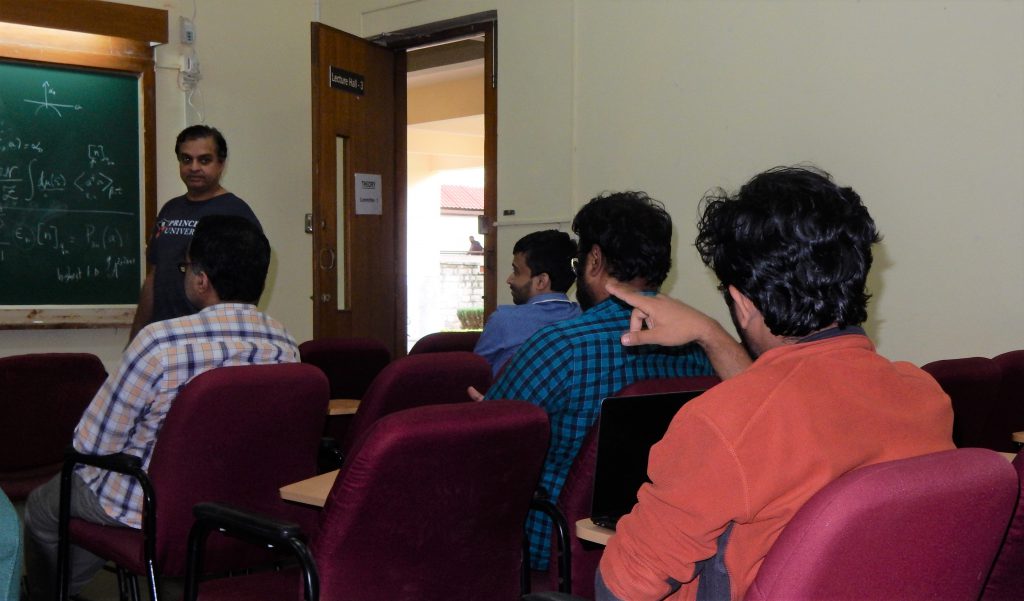
Today is Friday, and a group discussion is scheduled at the Centre in the evening. Seminars, conferences and group discussions are important components of postdoctoral life. As researchers work on original problems in the field, such occasions give them a chance to reflect upon and review their work and receive feedback from their peers. Lecture hall 3 is soon filled with the PhD and postdoctoral students of Aninda Sinha.
Aninda is scheduled to speak first, followed by a PhD student, Parthiv. Aninda begins his discussion on ‘scattering and knots’. He uses the blackboard to elaborate on his ideas with equations and diagrams. Sudip’s point on knots and polynomials is appreciated by Aninda. As the discussion becomes intense, Parthiv offers to forgo his turn, and urges Aninda to continue. The discussion ends on a light note as Aninda urges the students to Google scholars in the field before going to bed, instead of cricketers’ statistics.
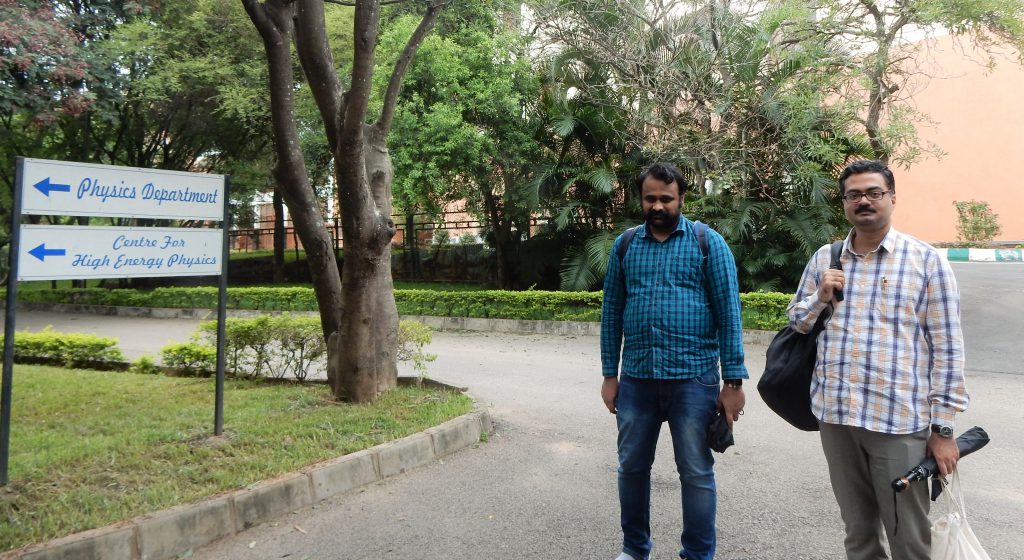
It is now dusk, and time to leave for home. Sudip and Prasanth walk out of the campus together, talking about the group discussion on the way. Each carries an umbrella, a notebook, a tiffin box and a laptop. Sudip would enjoy a cup of coffee after reaching home, rest for a while, and then continue to work on his equations. Today has been another day of interesting conversations and discovery in the life of a theoretical physicist.



